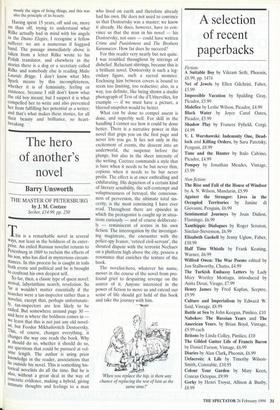The hero of another's novel
Barry Unsworth
THE MASTER OF PETERSBURG by J. M. Coetzee Secker, £1499, pp. 250 his is a remarkable novel in several ways, not least in the boldness of its enter- prise. An exiled Russian novelist returns to Petersburg in 1869 to reclaim the effects of his son, who has died in mysterious circum- stances. In this process he is caught in toils both erotic and political and he is brought to confront his own deepest self. So far, then, a classic type of quest novel: arrival, labyrinthine search, revelation. So far it wouldn't matter essentially if the searcher were a tax-inspector rather than a novelist, except that, perhaps unfortunate- ly,. tax-inspectors are less likely to be exiled. But somewhere around page 30 — and here is where the boldness comes in e learn that this is not just any old novel- ist, but Feodor Mikhailovitch Dostoevsky. This, of course, changes everything, it Changes the way one reads the book. Why It should do so, whether it should do so, are questions that could be pursued at vol- ume length. The author is using prior
owledge in the reader, associations that Ile outside his novel. This is something his- torical novelists do all the time. But he is also, without a great deal in the way of concrete evidence, making a hybrid, giving Intimate thoughts and feelings to a man who lived on earth and therefore already had his own. He does not need to convince us that Dostoevsky was a master; we know it already. He does, however, have to con- vince us that the man in his novel — his Dostoevsky, not ours — could have written Crime and Punishment and The Brothers Karamazov. How far does he succeed?
For this reader very nearly but not quite. I was troubled throughout by stirrings of disbelief. Reluctant stirrings, because this is a brilliant novel. Dostoevsky is such a leg- endary figure, such a sacred monster. Enclosing him between covers is bound to seem too limiting, too reductive; also, in a way, too definite, like being shown a studio photograph of Tess of the d'Urbervilles, for example — if we must have a picture, a blurred snapshot would be better.
What can be done to compel assent is done, and superbly well. For skill in the handling I cannot see how it could be done better. There is a narrative power in this novel that grips you on the first page and never lets you go. It lies not only in the excitement of events, the descent into an underworld, the suspense before the plunge, but also in the sheer intensity of the writing. Coetzee commands a style that is bare when it needs to be but never thin, copious when it needs to be but never prolix. The effect is at once enthralling and exhilarating. His depiction of a certain kind of literary sensibility, the self-contempt and voluptuousness of betrayal, the conscious- ness of perversion, the ultimate total sin- cerity, is the most convincing I have ever read. Throughout there are episodes in which the protagonist is caught up in situa- tions curiously — and of course deliberate- ly — reminiscent of scenes in his own fiction. The interrogation by the investigat- ing magistrate, the encounter with the police-spy Ivanov, 'retired civil-servant', the shouted dispute with the terrorist Nechaev on a platform high above the city, possess a resonance that enriches the texture of the book.
The novelist-hero, whatever his name, moves in the course of the novel from pro- found grief to despairing revenge on the source of it. Anyone interested in the power of fiction to move us and extend our sense of life should get hold of this book and take the journey with him.
'When you replace the hip, is there any chance of replacing the rest of him at the same time?'


























































 Previous page
Previous page